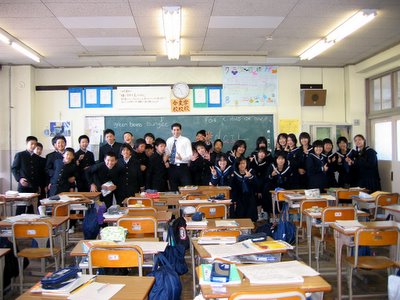It started with Douyoto’s 7th grade section 1-1, and it’s going to last until mid-March. Not long after I finally finished introducing hobbies, height and number of family members to the 50 classes in four junior high schools, it’s time to start saying good-bye. Forever. I beefed up my student photo alum with requests for class pictures. “I’ll never forget you, class 1-1,” I waxed in Japanese as students shuffled up to the board — some more willingly than others —while careful not to intermingle genders. Some paused for a moment, processing my profound words spoken in their native tongue. One boy felt moved enough to respond: “But I’ll forget you!” Thanks, kid.
I beefed up my student photo alum with requests for class pictures. “I’ll never forget you, class 1-1,” I waxed in Japanese as students shuffled up to the board — some more willingly than others —while careful not to intermingle genders. Some paused for a moment, processing my profound words spoken in their native tongue. One boy felt moved enough to respond: “But I’ll forget you!” Thanks, kid.
While hundreds of faces inevitably blur together, a few stand out. I’ll miss the two sumo. Only eight schools citywide have sumo teams, and Nebiko – a barrel of flesh – placed second in the Tokyo junior high tournament.
In the same class is his shorter sidekick, also with a shaved head and no neck, sort of like a soccer ball, but with ears shaped like satellite dishes. Neither can speak much English, and from what I saw of their compositions, their Japanese ain’t good either (mostly written in hiragana while other students used more complex kanji characters). Gambatte, guys.
I’ll also miss the 7th grader who, shaped more like a linebacker than a sumo, left red marks on my hand every time we high-fived. I won’t forget the patient pronunciation of another 7th grader with whom I spent hours after school reciting John Lennon’s “Imagine” for her eventual speech content triumph.  For the 9th graders soon to enlist in high school, I exploited the occasion of our last class to indoctrinate young minds with Jefu’s four tips for a good life:
For the 9th graders soon to enlist in high school, I exploited the occasion of our last class to indoctrinate young minds with Jefu’s four tips for a good life:
#4 Follow your heart, desires, dreams, passions, whatever. I think I used the phrase, “Be all that you can be,” but left out the toll free U.S. Army recruitment number. Just don’t become joyless dark-suited sacks of salarymen. Japan already has more than its fair share.
#3 Come visit me in New York. Not now, but once you master enunciating “r”s and “l”s as different sounds.
#2 Keep practicing your English. It might land you a better job. You are very young, and can eventually become fluent like me (laughs of disagreement).
#1 Do. Not. Smoke. (Pounding heart and lungs) Ever. I know your grandmother and father’s mistress do, but I don’t care if you never practice your English again so long as you aren’t plunking change into a cigarette vending machine glowing from every street corner.
“Yayaaa,” one boy with spiky hair moaned while squirming in his seat. “I inherited a strong body from my mother, so I will be okay.” The Japanese English teacher laughed and translated, whereupon I shook my head. Still, I remain hopeful that when such decision-making times come in the future, that they’ll remember the cool, tobacco-free New Yorker who made English class slightly less boring than usual.
This influential power of teachers became apparent near the end of a 7th grade class. A nondescript boy approached me with a pad of Post-Its. He wanted me to sign the first two. My eyes followed him back to his seat. How would he tarnish sensei’s name?
Suspicion dissolved into disbelief as I watched him open a glue stick and carefully adhere my signature to the cover of his notebook. A lump formed in my throat. It was that moment that validated my entire Japanese experience.
Thursday, January 26, 2006
The Long Goodbye
Subscribe to:
Post Comments (Atom)



1 comment:
so are you leaving Japan, or just teaching?
Post a Comment